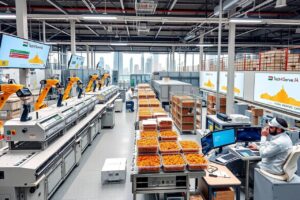Food Safety & Compliance in UAE: Why It Matters for Food Businesses
The UAE’s food industry is thriving, with Dubai and Abu Dhabi emerging as global hubs for food trade, processing, and innovation. However, with this growth comes an equally strong emphasis on food safety and compliance.
Consumers in the Emirates are highly quality-conscious, and the government has strict regulations to ensure that every restaurant, café, or food factory delivers products that are safe, hygienic, and compliant with international standards.
For entrepreneurs and investors, staying ahead of these requirements is not just about avoiding penalties – it’s about building consumer trust and ensuring long-term success. This is where experienced Food Business Consultants play a critical role.
The Importance of Food Safety in UAE
Food safety is more than a legal obligation in the UAE — it is central to the country’s national strategy for food security. According to the UAE National Food Security Strategy 2051, ensuring safe and sustainable food supply is a government priority.
Key reasons food safety matters:
- Consumer Health Protection
UAE residents and tourists expect high-quality, safe meals. One incident of food poisoning can cause reputational damage to a brand. - Regulatory Compliance
Dubai Municipality, Abu Dhabi Agriculture and Food Safety Authority (ADAFSA), and other authorities enforce strict inspection and licensing systems. - Global Reputation
As a hub for international trade and tourism, the UAE maintains strict standards to align with global food safety practices such as HACCP and ISO 22000.
Regulatory Bodies Overseeing Food Safety in UAE
Food safety in the UAE is regulated by multiple entities to ensure consistency across Emirates:
- Dubai Municipality: Oversees food safety regulations, licensing, and inspections in Dubai.
- ADAFSA: Responsible for food safety in Abu Dhabi.
- Ministry of Climate Change and Environment (MOCCAE): Handles federal food safety policies and import regulations.
- Emirates Authority for Standardization & Metrology (ESMA): Defines technical standards and certification.
Working with Food Industry Consultants ensures that businesses remain compliant with the correct authorities.
Key Compliance Requirements for Food Businesses
To operate successfully in the UAE, every food business must adhere to:
- Trade License & Food License
Businesses require approval from Dubai Economy (DED) and Dubai Municipality or ADAFSA depending on location. - HACCP & ISO Certification
Implementing Hazard Analysis and Critical Control Points (HACCP) systems is mandatory for most food facilities. Many also pursue ISO 22000 for international credibility. - Food Handler Training
All employees handling food must undergo training approved by the Dubai Municipality Food Safety Department. - Facility & Equipment Standards
Kitchens, food factories, and cafés must follow strict design requirements — from ventilation to waste disposal — which is why engaging Food Factory Design Consultants is essential. - Labeling & Packaging Regulations
Products must comply with GSO standards for labeling and packaging, ensuring transparency for consumers.
Challenges Businesses Face
While compliance is non-negotiable, many entrepreneurs struggle with:
- Navigating multiple regulatory authorities
- High costs of non-compliance penalties
- Understanding HACCP implementation
- Designing kitchens or factories that meet UAE codes
- Training staff consistently
This is why professional Food Consultancy Services become vital.
Role of Food Consultants in Compliance
At Tech4Serve UAE, we help businesses streamline compliance so they can focus on growth. Our expertise includes:
- Licensing & Approvals – Guiding through Dubai Municipality and ADAFSA requirements.
- Food Factory Setup – As a Turnkey Food Factory Consultant, we ensure your facility design meets regulatory standards.
- HACCP & ISO Certification Support – Assisting with audits, training, and documentation.
- QSR & Café Compliance – Our QSR Consultants and Cafe Consultants ensure smaller businesses meet all requirements affordably.
- Training Programs – Building awareness and compliance culture among staff.
Why Compliance Drives Business Success
Compliance isn’t just about avoiding penalties; it builds:
- Consumer Trust: Customers prefer brands with a reputation for hygiene and safety.
- Investor Confidence: Financial backers look for compliance-ready businesses.
- Market Expansion: Certifications like ISO 22000 open doors to exports and partnerships.
- Sustainability: Safe practices minimize waste and ensure long-term viability.
Case in Point: UAE’s Focus on Food Traceability
Recently, the UAE has emphasized food traceability systems to track ingredients from source to plate. This protects consumers and positions the UAE as a leader in transparent food systems, creating new opportunities for tech-driven solutions in the food sector.
Conclusion
The UAE’s food market offers immense opportunities, but only for those who prioritize food safety and compliance. With authorities setting global benchmarks, staying compliant is not optional — it’s the foundation of success.
By working with expert Food Processing Consultants and Food Business Experts at Tech4Serve UAE, businesses can simplify compliance, protect their brand, and grow with confidence.
FAQs
Q1. Do small cafés also need HACCP in Dubai?
Yes, even small operators must follow food safety standards. HACCP is recommended for all, regardless of size.
Q2. How long does it take to get food safety approvals?
Depending on your business type, licensing can take anywhere from 2 to 6 weeks.
Q3. Can Tech4Serve help with ISO 22000 certification?
Absolutely. Our team supports documentation, audits, and system implementation.
Q4. What happens if a business fails a Dubai Municipality food inspection?
Penalties range from fines to temporary closure. Our consultants help avoid such risks.







